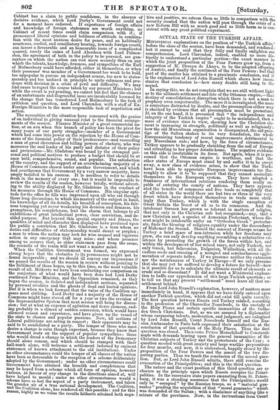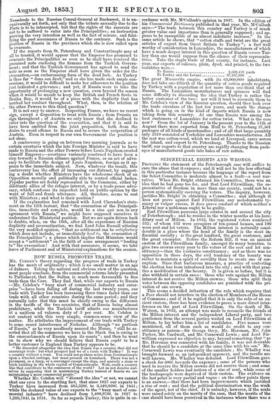ACTUAL STATE OF THE TUREJSH AFFAIR.
MINISTRILIAL explanations on the position of "the Turkish affair," before the close of the session, have been demanded, and rendered : but it cannot be said that they fully and finally enlighten our comprehension. Lord Clarendon, indeed, enabled us more dis- tinctly to understand a particular portion—the exact manner in which the joint proposition of the Four Powers grew up, from a suggestion of M. Drouyn de Lhnys, to be the adopted offspring of Austria, and finally the sentiment of the Four Powers : but that part of the matter has attained to a proximate conclusion, and it is the explanation of Lord John Russell which shows how incon- clusive that conclusion is—how many doubts still hang to the sequeL
In saying this, we do not complain that we are still without light as to the ultimate settlement and fate of the Ottoman empire,—that destiny of consolidation or disruption which there is not a man to prophesy even conjecturally. The more it is investigated, the more is conjecture distracted by doubts, and the presumption either way is checked by evidence that all presumption must be premature. If, on the one hand, it is presumed that "the independence and integrity of the Turkish empire" ought to be maintained, then a mass of evidence rises to view, showing how the Christian ele- ment is increasing in strength, politically as well as religiously ; how the old Mussulman organization is disorganized, the old pres- tige of the Sultan shaken to its very foundation, the whole Europeanizing tendency of recent improvements detrimental to any Mussulman rule ; and how, by the force of circumstances, Turkey appears to be gradually shrinking from the soil of Europe and retreating to her proper Asiatic home. The negative evidence on this side is irrefutable in its force. But again, when it is pre- sumed that the Ottoman empire is worthless, and that the other states of Europe must stand by and suffer it to be swept away, a new class of evidence arises, to show that the Turks have been able to appreciate European improvements too tho- roughly to allow it to be supposed that they cannot assimilate themselves to the European system. They have adopted a frankness of international relations rendering them really ca- pable of entering the comity of nations. They have appreci- ated the benefits of commerce and free trade so completely that of all states in the world there are but two or three of the very freest which have developed themselves in trade more strik- ingly than Turkey, which is with the single exception of Great Britain the freest of all as to. its commerce. And the intolerant Saracen has grown so tolerant in matters of religion, that not only is the Christian safe but recognized,—nay, that a new Christian sect, a species of Armenian Protestant, whose dis- sent might be intolerable under an "Orthodox Greek" protector- ate finds the blessing of religious equality under the descendants of protector- ate, the Second. Should the consent of Europe scent° for Turkey a brief space of non-intrusion while her freedoms may grow, she can -only develop anything resembling a substantive ex- istence by promoting the growth of the forces within her, and within the development of her mixed races not only Turkish, not
only Greek, but Sclavonian, Bulgarian, races, with all the endless seeds and crossing of a mongrel and semibarbarous agglo- meration of separate tribes. If we presume neither the extension nor the maintenance of Turkey in Europe—if we only presume that she may yet be suffered to develop a future for herself—how is it possible for us to calculate the ultimate result of elements so crude and so discordant P It did not want a Ministerial explana- tion to baffle our apprehensien of this large -Turkish question ; or to tell us that any present "settlement" must leave all that un- settlement behind.
From Lord John Russell's explanation, however, of matters more immediately in hand, it appears that we have fairly entered upon another Turkish question, which did not exist till quite recently. The first question between Russia and Turkey related, according to the profession of the Chancellor Nesselrode, to the custody of the Holy Places and certain specific immunities of the Ortho- dox Greek Christians. But, as we are assured by a diplomatist whose surpassing talents, moderation, and judgment, are eul • ed by Lord john Russell, Count Nesselrode himself and theRus- sian Ambassador in Paris both expressed their satisfaction at the conclusion of that question of the Holy Places. Thus the first question was closed. Then came Prince Mensehikoff to Constanti- nople with demands bearing upon the general immunities of the Christian subjects of Turkey and the protectorate of the Czar ; a question mooted with great anxiety and large warlike preparations for four months, and now, it is understood, happily closed by the proposition of the Four Powers and the assent of the two dis- puting parties. Thus we touch the conclusion of the second ques- tion. But, as Lord John Russell admits, there still remains the evacuation of the Principalities ; and this is the third question.
The nature and the exact position of this third question are as obscure as the principle upon which Russia occupies the Princi- palities. In the successive state papers emanating from St. Peters- burg, it was a standing assurance that the Principalities would only be " occupied " by the Russian troops, as a "material gua- rantee" pending the acquisition of that "moral guarantee" which was demanded of the Sultan ; with a disclaimer of anything like a seizure of the provinces. Now, in the instructions from Count Nesselrode to the Russian Consul-General at Bucharest, it is un- equivocally set forth, not only that the tribute annually due to the Porte is to be intercepted, but that the rights of the suzerain are not to be suffered to enter into the Principalities ; an instruction proving the very intention as well as the fact of seizure, and falsi- fying the past assurances of Russia to the contrary. Such is the position of Russia in the provinces which she is now called upon to evacuate.
If the reports from St. Petersburg and Constantinople may at all be trusted, it would appear that the Emperor has promised to evacuate the Principalities as soon as he shall have received the promised note enclosing the firmans from the Turkish Govern- ment; and that the Turkish Government has agreed to send the note as soon as the Emperor shall have given the order for the avacuation,—an embarrassing form of the dead lock. As Turkey is thus far "dens son droit," and as she has made such ample con- cessions, it would be difficult to make her adherence to the position just indicated a grievance ; and yet, if Russia were to take the opportunity of prolonging a new question, even beyond the season when it would be unsafe to keep the British and French fleets in Besika Bay, it would be of a piece with the duplicity that has marked her conduct throughout. What, then, is the relation of the other Powers to this third question ?
It is not easy to answer. Respecting France, we have no recent sign, except a disposition to treat with Russia ; from Prussia no sign throughout ; of Austria we only know that she declined to enter into the question of the evacuation, and that it is said to have been omitted from the joint proposition, both from the desire to avoid offence to Russia and to secure the cooperation of Austria. Even in respect to our own Government the position is not clear.
A controversy is going on between two morning journals as to certain overtures which the late Foreign Minister is said to have made to Russia and the other Powers before Louis Napoleon created himself Emperor ;—overtures variously construed to have been a step towards a Russian alliance against France, or an act of advo- cacy to facilitate the design of Louis Napoleon, foreign as it ap- pears to the immediate subject. Now, whatever the result, this controversy, has the effect of increasing our distrust, by suggest- ing a doubt whether Ministers have the wholesome check of an Opposition morally and politically able to control official laohes. Popular parties are feebly represented in the Commons, either by dilettante allies of the refugee interest, or by a trade-peace advo- cacy, which confesses its imperfect hold on public opinion by the want of full and frank utterance. All, therefore, seems to rest with Ministers ; and what is their position?
If the explanation had remained with Lord Clarendon's state- ment on the 12th instant, that "the evacuation of the Principali- ties, immediate and complete, would be a sine qua non in any agreement with Russia," we might have supposed ourselves to understand the Ministerial position. But we are again driven back to doubts, when, on the 16th, after all the experience of Russian duplicity and procrastination, we find Lord John Russell uttering the very modified opinion, "that no settlement can be satisfactory which does not include, or immediately lead to, the evacuation of the Principalities"; a phrase which implies that Ministers would accept a " settlement " on the faith of some arrangement "leading to" the evacuation ! And with that assurance, it seems, we take leave of Parliament and of Ministerial explanations for the session.



























 Previous page
Previous page